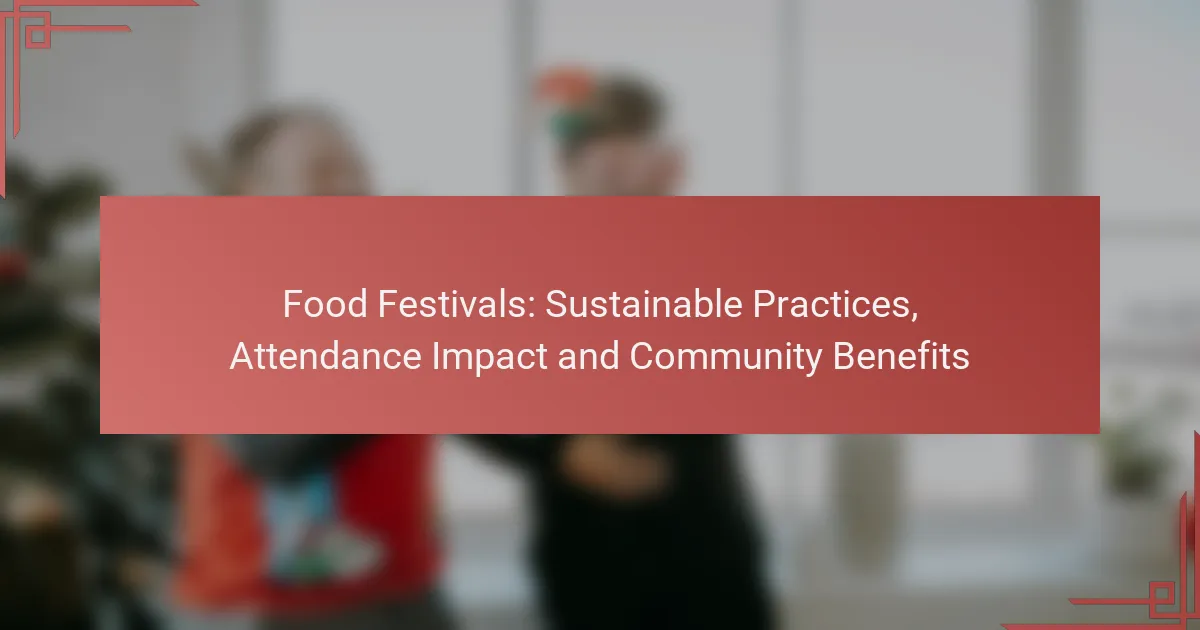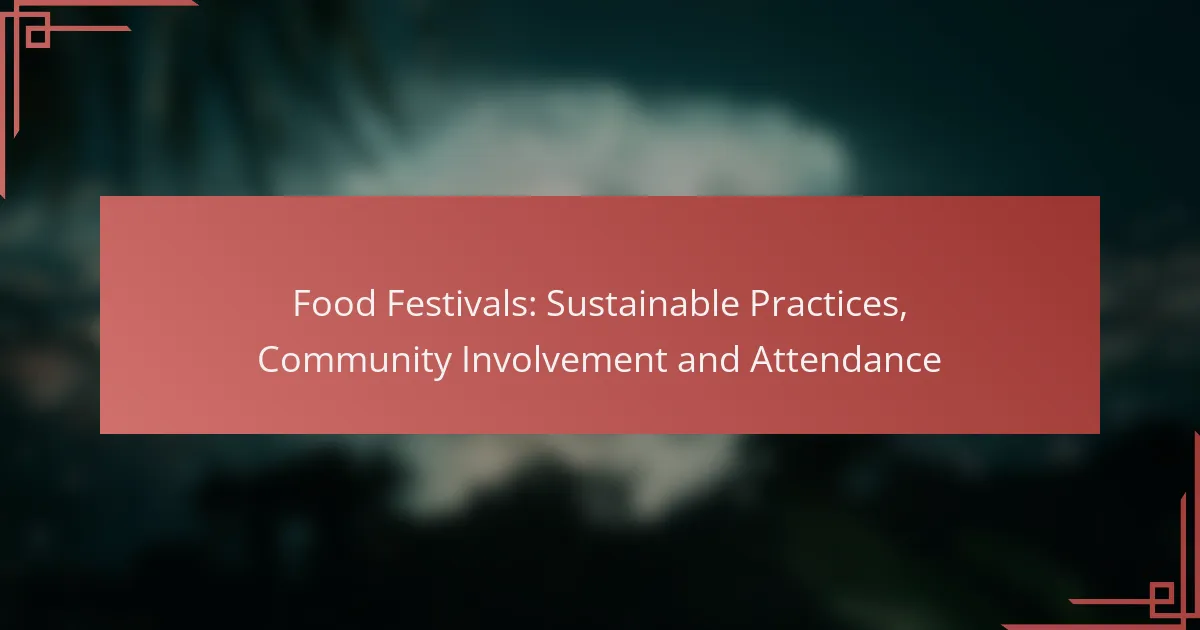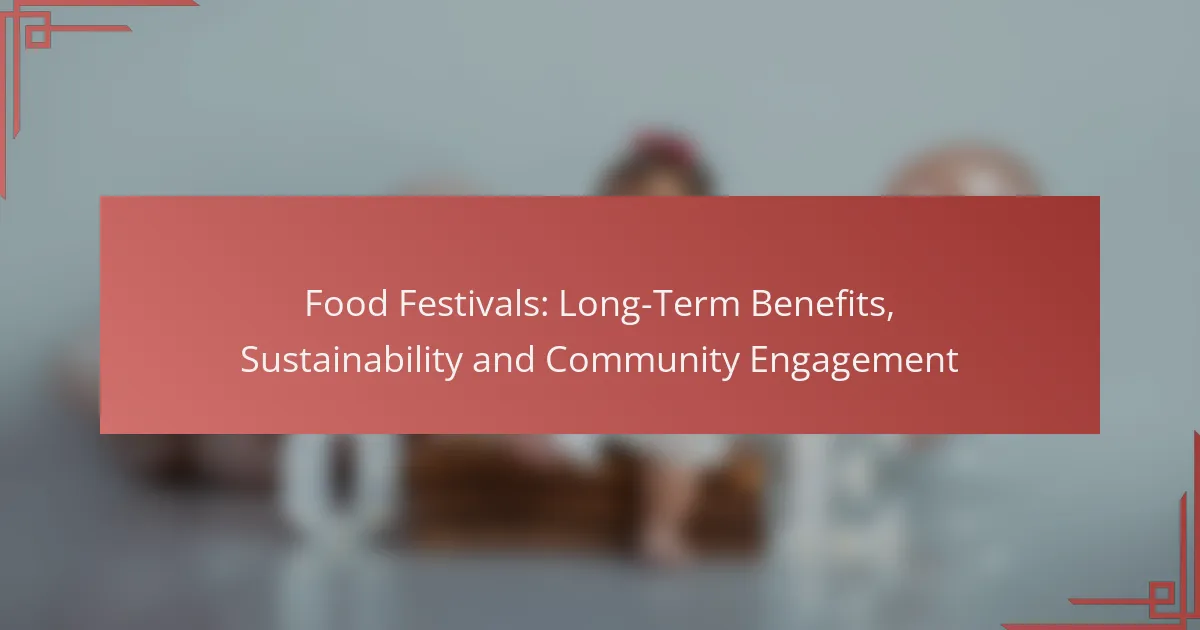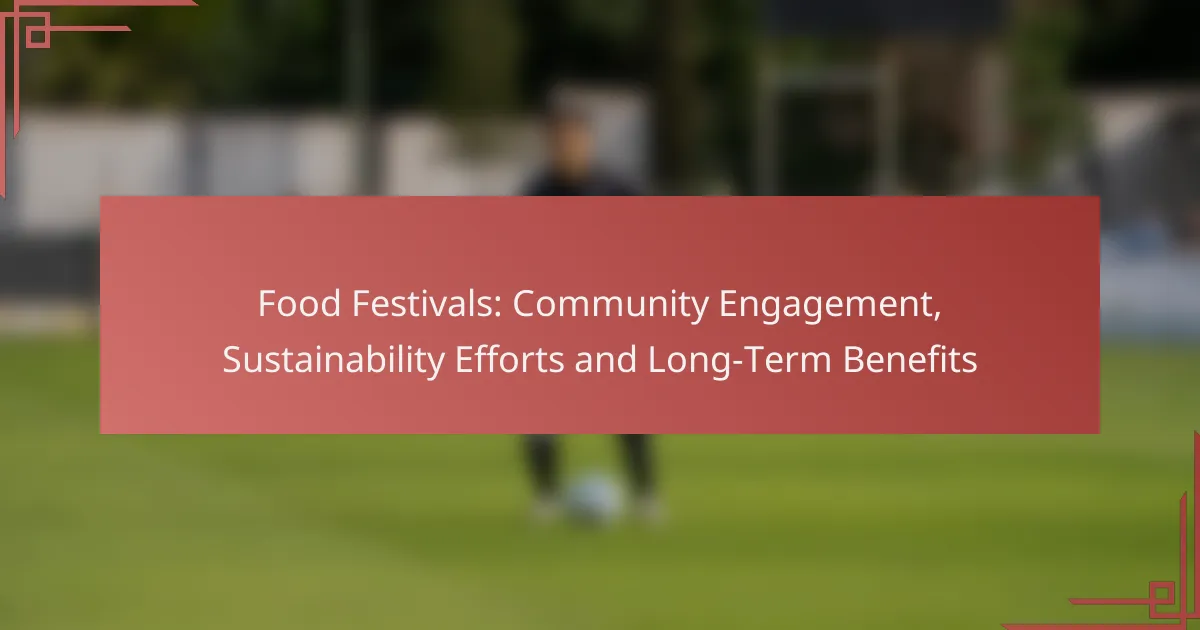Food festivals serve as vibrant platforms for promoting sustainable practices while simultaneously benefiting local communities. By minimizing environmental impact and supporting local economies, these events not only attract attendees but also foster economic growth and cultural connections. Through increased attendance, food festivals generate revenue and create jobs, enhancing community engagement and celebrating regional culinary traditions.

How do food festivals promote sustainable practices?
Food festivals promote sustainable practices by implementing various strategies that minimize environmental impact and enhance community engagement. These practices not only reduce waste but also support local economies and educate attendees about sustainability.
Waste reduction initiatives
Food festivals often incorporate waste reduction initiatives such as composting and recycling programs. By providing clearly marked bins for compost, recyclables, and landfill waste, festivals can significantly decrease the amount of trash sent to landfills.
Some festivals partner with local organizations to manage food waste, donating surplus food to shelters or food banks. This not only helps those in need but also reduces the environmental footprint of the event.
Local sourcing of ingredients
Many food festivals prioritize local sourcing of ingredients, which supports nearby farmers and reduces transportation emissions. By featuring local produce, meats, and dairy, these festivals help create a more sustainable food system.
Attendees can often taste the difference in freshness and quality, making local sourcing a win-win for both the environment and festival-goers. Additionally, this practice fosters community relationships and encourages consumers to support local businesses year-round.
Eco-friendly packaging solutions
Eco-friendly packaging solutions are crucial for minimizing waste at food festivals. Many vendors opt for biodegradable or compostable materials instead of traditional plastics, which can take centuries to decompose.
Festivals may also encourage attendees to bring their own reusable containers or provide incentives for those who do. This not only reduces waste but also raises awareness about the importance of sustainable packaging choices.
Community education programs
Community education programs at food festivals play a vital role in promoting sustainable practices. Workshops and demonstrations on topics like composting, gardening, and cooking with local ingredients empower attendees to adopt sustainable habits at home.
By engaging the community in discussions about sustainability, festivals can inspire long-term changes in behavior, fostering a culture of environmental responsibility that extends beyond the event itself.

What is the impact of attendance on local economies?
Attendance at food festivals significantly boosts local economies by increasing revenue, creating jobs, and supporting local businesses. These events attract visitors who spend money on various services, leading to a ripple effect throughout the community.
Increased tourism revenue
Food festivals draw tourists, which enhances tourism revenue for local areas. Visitors often spend on accommodations, dining, and entertainment, contributing to the overall economic growth of the region.
For example, a successful festival can increase hotel bookings by 20-30% during the event weekend, benefiting local hospitality providers. This influx of tourists can lead to long-term relationships with visitors who may return in the future.
Job creation in hospitality
As attendance rises, so does the demand for services, leading to job creation in the hospitality sector. Local restaurants, hotels, and event organizers often hire additional staff to accommodate the influx of attendees.
Seasonal jobs may increase by 10-15% during festival periods, providing opportunities for both full-time and part-time workers. This not only supports the local workforce but also enhances the skills of employees in the hospitality industry.
Support for local businesses
Food festivals provide a platform for local businesses to showcase their products and services, fostering community support. Vendors, artisans, and farmers benefit from increased visibility and direct sales to festival-goers.
Additionally, local businesses often collaborate with festival organizers to create unique experiences, such as cooking demonstrations or farm-to-table dinners, which can enhance community ties and promote sustainable practices.

How do food festivals benefit local communities?
Food festivals provide significant advantages to local communities by fostering economic growth, enhancing cultural ties, and promoting social interactions. These events create opportunities for local businesses, encourage community involvement, and celebrate regional culinary traditions.
Cultural exchange opportunities
Food festivals serve as a platform for cultural exchange, allowing attendees to experience diverse culinary traditions. Visitors can taste dishes from various cultures, participate in cooking demonstrations, and attend workshops that highlight different cooking techniques and ingredients.
This exchange not only enriches the community’s culinary landscape but also promotes understanding and appreciation of different cultures. Local chefs and food artisans can share their heritage, fostering a sense of pride and connection among residents.
Community engagement and volunteering
Food festivals often rely on community volunteers to help with organization, setup, and event management. This involvement fosters a sense of ownership and pride among residents, as they contribute to the success of the festival.
Engaging the community in these events can lead to increased social cohesion, as people come together to support local initiatives. Additionally, volunteering provides individuals with valuable skills and networking opportunities that can benefit them in their personal and professional lives.
Promotion of local artisans
Food festivals highlight local artisans, including farmers, bakers, and craft beverage producers, giving them a platform to showcase their products. This exposure can significantly boost their visibility and sales, helping to sustain local businesses.
By promoting local artisans, festivals encourage consumers to support their community, often leading to a preference for locally sourced ingredients and products. This not only strengthens the local economy but also fosters a sense of community identity and pride in local craftsmanship.
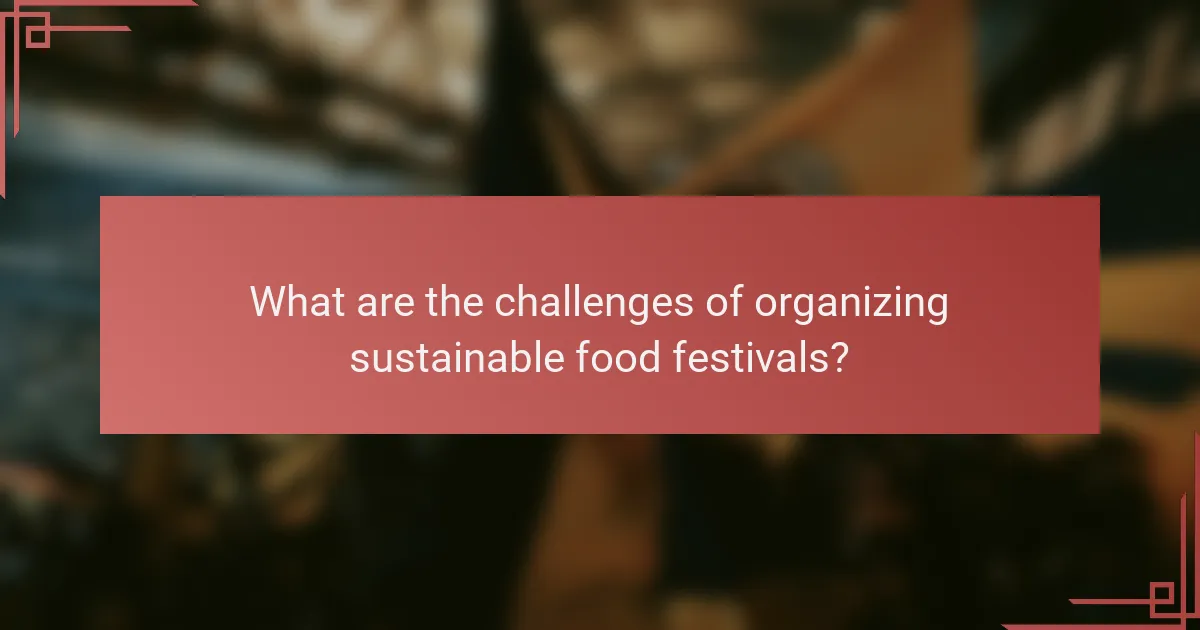
What are the challenges of organizing sustainable food festivals?
Organizing sustainable food festivals presents several challenges that can impact both the event’s success and its environmental goals. Key issues include high operational costs, logistical complexities, and the need to balance sustainability with profitability.
High operational costs
One of the primary challenges in organizing sustainable food festivals is the high operational costs associated with eco-friendly practices. These can include sourcing organic ingredients, utilizing sustainable materials for booths and utensils, and implementing waste management systems. For instance, using compostable plates instead of plastic can significantly increase expenses.
Event organizers should budget for these costs early on, aiming to allocate at least 20-30% of their total budget to sustainable practices. This upfront investment can lead to long-term savings and a positive brand image.
Logistical complexities
Logistical complexities arise when trying to implement sustainable practices at food festivals. Coordinating with local farmers, managing transportation for fresh produce, and ensuring that vendors comply with sustainability standards can be challenging. Additionally, the need for proper waste disposal and recycling systems adds another layer of complexity.
To mitigate these issues, organizers can develop a detailed logistics plan that outlines responsibilities and timelines. Collaborating with local suppliers and waste management companies can streamline operations and enhance sustainability efforts.
Balancing sustainability with profitability
Finding the right balance between sustainability and profitability is crucial for the success of food festivals. While eco-friendly practices can attract a dedicated audience, they may also lead to higher ticket prices or reduced profit margins. Organizers must carefully consider pricing strategies that reflect their commitment to sustainability while remaining accessible to attendees.
Offering tiered ticket options or sponsorship packages can help generate revenue without compromising sustainability goals. Engaging the community through partnerships and local sponsorships can also enhance profitability while promoting sustainable practices.

How can attendees contribute to sustainability at food festivals?
Attendees can significantly enhance sustainability at food festivals by making conscious choices in transportation, waste management, and vendor support. By actively participating in these areas, festival-goers help reduce environmental impact and promote eco-friendly practices.
Choosing eco-friendly transportation
Selecting eco-friendly transportation options is a crucial step for attendees aiming to contribute to sustainability. Consider using public transport, biking, or carpooling to minimize carbon emissions. Many festivals provide shuttle services or bike parking to encourage these greener choices.
When planning your trip, check local transit schedules and routes to ensure a smooth journey. If driving is necessary, consider sharing rides with friends or fellow attendees to reduce the number of vehicles on the road.
Participating in recycling programs
Engaging in recycling programs at food festivals is essential for reducing waste. Most festivals offer designated recycling bins for plastics, metals, and paper products. Familiarize yourself with the recycling guidelines provided at the event to ensure proper disposal.
Bring reusable containers for leftovers and drinks to minimize single-use items. Some festivals may even offer incentives, like discounts or tokens, for attendees who actively participate in recycling efforts.
Supporting sustainable vendors
Choosing to support sustainable vendors is a powerful way to promote eco-friendly practices at food festivals. Look for vendors who prioritize local sourcing, organic ingredients, and environmentally friendly packaging. These vendors often highlight their sustainability efforts through signage or menus.
Engage with vendors about their practices and ask questions about their sourcing methods. By supporting those who prioritize sustainability, attendees help create a market demand for eco-friendly options, encouraging more vendors to adopt similar practices.

What are the emerging trends in food festivals?
Emerging trends in food festivals focus on sustainability, inclusivity, and innovation. Organizers are increasingly prioritizing eco-friendly practices, diverse food options, and community engagement to enhance the overall experience for attendees.
Plant-based food offerings
Plant-based food offerings are becoming a staple at food festivals, reflecting a growing consumer interest in health and sustainability. These options often include a variety of dishes made from fruits, vegetables, legumes, and grains, catering to both vegans and those looking to reduce meat consumption.
When planning a food festival, consider incorporating local plant-based vendors to highlight regional produce and culinary traditions. This not only supports local agriculture but also attracts a wider audience interested in sustainable eating practices.
To maximize the appeal of plant-based offerings, ensure there is a diverse range of flavors and cuisines represented. For example, featuring dishes like vegan tacos, plant-based sushi, or hearty grain bowls can attract a broad demographic and enhance the festival’s reputation.
